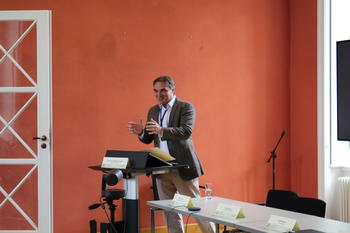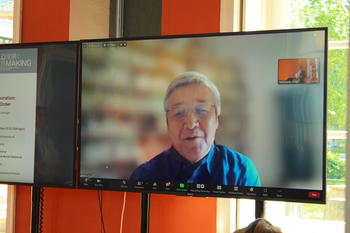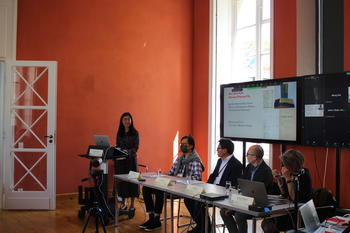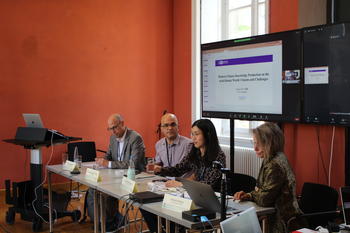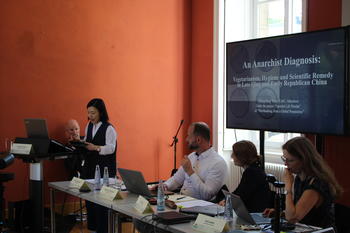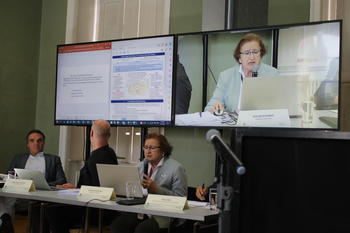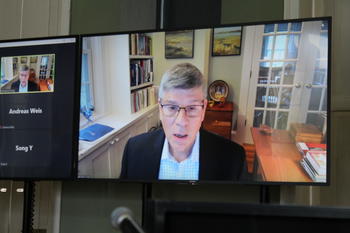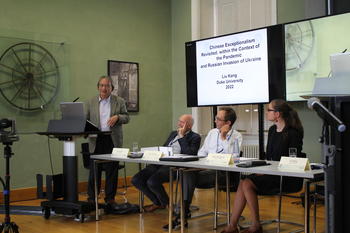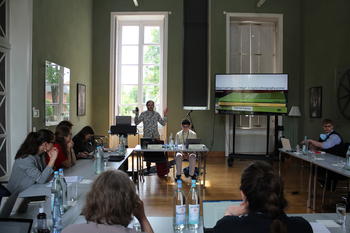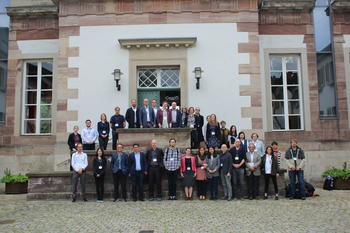Annual Conference of the Joint Center "Global Conflicts, Global Collaboration: China in a Changing World Order"
Opening and Welcome: Dominic Sachsenmaier (University of Göttingen)
Keynote Address by Wang Hui (Tsinghua University)
Panel I. Conceptions of China and its Place in the World: Historical Perspectives
Panel II. China and its Muslim Borderlands: Global Entanglements and Contestations
Panel III. Environment and Health as Sources of Global Conflict and Collaboration
Panel IV. Carrier or Challenger? China and East Asia in Contemporary Debates on World Order
Keynote Address by William C. Kirby (Harvard University)
Panel V. The Global Impact of the Ukraine War: Situating China in a New Context
Panel VI. Social Worlds and their Urban Dynamics: Cities as Contested Spaces
Digital and Remote Methods for Exploring Social Worlds
Annual Conference 2022
From June 2 to June 4, 2022, the University of Göttingen hosted the first annual conference of the Joint Center of Advanced Studies Worldmaking from a Global Perspective: A Dialogue with China. This event brought together project members and fellows from all of the Joint Center’s participating locations (Heidelberg, FU Berlin, Würzburg, and Göttingen), as well as additional invited scholars. The theme of the conference was Global Conflicts, Global Collaboration: China in a Changing World Order. Under this umbrella, the conference – among other subjects – discussed arenas where shared global issues emerge but also become sources of geopolitical contestations. A range of thematic clusters was discussed, including China’s place in historical and contemporary conceptions of world order; the impact of the Ukraine War on China’s place in the world; China and its Muslim borderlands; environment and health as sources of global collaboration and conflict; and cities as socially contested spaces.
The conference was held in a hybrid format. It took place at the Historical Observatory in Göttingen, and online participants accessed via Zoom. Two panels and a keynote lecture that dealt with China’s place in shifting global orders were broadcast to a wider public.
The first day of the conference started with a keynote speech by Wang Hui (Tsinghua University) on Overlapping Conflicts and Shared Destiny: Two Perspectives on China’s Role in the World. Drawing on the distinctions of the understandings related to the imperialist international law, Wang analyzed the case of the Ryukyu Islands from the late 19th Century till the present.
On June 2, the first panel focused on Conceptions of China and its Place in the World, chaired by Janice Hyeju Jeong (University of Göttingen). Yin Shoufu (University of British Columbia) compared amongst others Manchu, Russian and Belgian re-narrations of the Jurchen political philosophy in his presentation on The Jurchen Statecraft in Global History and Comparative Political Theory beyond Nation-state. Tang Chenxi (University of California, Berkeley) examined The Making of the Idea of China in the Eighteenth Century and highlighted the universalist ideology of governance in multi-ethnic Qing China, and discourses on China as a counter-image to European modernity. Chu Sinan (GIGA Hamburg) presented a critique of the field of Chinese International Relations and questioned power dynamics in knowledge production: between western and non-western IR, and also within Chinese IR scholarship. Barbara Mittler (University of Heidelberg) demonstrated in her talk on Envisioning Asia: Mao and Gandhi as Global Icons (mid-20th Century) the parallels between visualizations of the two iconic persons, Mao and Gandhi, in their photographs.
The second panel focused on China and its Muslim Borderlands: Global Entanglements and Contestations, chairedby Barbara Mittler (University of Heidelberg). Wen Shuang (NYU Shanghai) discussed the chasm and challenges of modern Chinese knowledge production on the Arabic/Islamic worlds, highlighting the scarcity of archival work in the Arab world and mismatched Arabic language talents as some of the reasons reinforcing stereotypes and misunderstanding. Janice Hyeju Jeong (University of Göttingen) examined Fei Xiaotong’s conceptions of Islam in his ethnographic work “Linxia Xing” from 1987, which positioned Muslims at the center of “revival” and “reopening” of historic Silk Roads. Mohammadbagher Forough’s (GIGA Hamburg) presentation on The Framing of Political Islam in Sino-Middle Eastern Relations identified selective securitization of political Islam as the reason behind the Middle East region’s silence on the Xinjiang case. The last presentation in this panel on The CCP’s Policies of Governing Islam in Contemporary Xinjiang by Björn Alpermann (University of Würzburg) put the spotlight on policy-making and developments in China’s Northwestern region aimed at Sinicization, and the related academic discourse.
On June 3, the third panel centered on Environment and Health as Sources of Global Conflict and Collaboration, chaired by Sebastian Conrad (FU Berlin). Wang Shangshang (LMU Munich) presented her research entitled An Anarchist Diagnosis: Vegetarianism, Hygiene and Scientific Remedy in Late Qing and Early Republican China,contextualizing the promotion of soybean in the early 20th century in a bio-political framework. The presentation by Matthias Schumann (University of Heidelberg) on Between Competition and Cooperation: Lü Bicheng and the Promotion of Chinese Vegetarianism in a Global Context analyzed the transformation of Buddhist vegetarianism from individual pursuit of salvation to greater social and political significance by linking it to concerns such as world peace or animal protection. The presentation on Barefoot Doctors in Global Health: Knowledge and Ignorance as Worldmaking Forces by Emily Graf (FU Berlin) studied ignorance under the framework of anti-elitism and anti-expertism as a talent of barefoot doctors, as representatives of merging competing systems of the East and West. Sara Landa (University of Heidelberg) contributed to this panel with a presentation on Socialist Ecocosmopolitanism? Literary Translation and Transcultural Ecocritical Dialogues.
Two public panels and a keynote speech in the afternoon on the second day discussed the implications of the current global crises on China’s place in the world. Among other themes, implications of the war in Ukraine on the PRC’s multiple global roles and international policies were discussed. This event was broadcast online and was digitally attended by more than sixty people.
The fourth panel chaired by Dominic Sachsenmaier (University of Göttingen) covered the topic Carrier or Challenger? China and East Asia in Contemporary Debates on World Order, addressing both former, current and possible future transformations. Sebastian Conrad (FU Berlin) discussed the Transformations of Territoriality in East Asia in the Nineteenth Century, analyzing shifting geographies of Japanese world-making. Tansen Sen (NYU Shanghai) pointed out the importance of the study of unmaking of Asia as well as the attempts at Asia-making in his talk on The Recurring Idea (and Failure) of the Asian Century. Selcuk Esenbel (Bogazici University) presented insights into Japan’s projections on the global economy until 2050 and the impact of the Ukraine war in her talk on The End to Global Multi-Polarity? The Indo-Pacific Maritime versus the Eurasian Hinterland – The Ukraine Crisis and the Japanese Perspective on the Making of a New World Order of Transcontinental Alliances and Free Trade Zones. Fan Xin’s (State University of New York at Fredonia) study on The World as Historical Analogy: The Thucydides Trap Debate in Recent China inquired both the use and abuse of historical analogies and worldmaking/world history as a research approach.
The keynote address by William C. Kirby (Harvard University) on China and the World in the ‘New Era’: Reflections after February 24, 2022 preceded the fifth panel on The Global Impact of the Ukraine War: Situating China in a New Context. The talk pointed out the global transfers that shaped higher education in China, and the need to keep engaging in academic conversations in situations of conflict. Sören Urbansky (German Historical Institute Washington/Berkeley) examined the historic development of the relations between China and Russia in his presentation on Friends with Benefits: Some Thoughts about the Past and Present of Sino-Russian Relations. Maryia Danilovich (University of Göttingen) analyzed the views of Chinese officials, media, and experts on the Ukraine War in 2022. Liu Kang (Duke University) identified the concept of Chinese exceptionalism within the context of the Sars-CoV-2 pandemic and the Russian invasion of Ukraine. This panel was chaired by Hans van Ess (LMU Munich), Selcuk Esenbel (Bogazici University) served as the discussant. The presentations and commentary were followed by a lively discussion with the audience.
The sixth and final panel on June 4 dealt with Social Worlds and their Urban Dynamics: Cities as Contested Spaces and was chaired by Björn Alpermann (University of Würzburg). Stefan Berger (Ruhr University Bochum) started the third day of the conference by tracing different temporalities within the context of his talk Deindustrialization in Urban Contexts: Global Historical Perspectives. Elena Meyer-Clement (University of Copenhagen) demonstrated in a presentation on The Politics of Social Worlds among China’s New Urbanites another top-down approach by cadres trying to regulate the behavior of resettled villagers. In contrast, Jiazhi Fengjiang’s (University of Edinburgh) study on grassroots philanthropy revealed an organized charity and volunteerism from below. The talk on “A World of Strangers”: Shaping Public Space in Urban Guangzhou by Ryanne Flock (University of Würzburg) focused on the social world of panhandling, analyzing social relations among beggars and discussing questions of legitimacy. The study by Song Yu (Xi’an Jiaotong-Liverpool University) on Culture-led Urban Regeneration in China: A Case Study of Dongshengli Neighborhood in Suzhou gave insight into the transformation of physical space into popular cultural space through an interplay of various actors, and discovered dialogue and exchange between tradition and modernity, East and West, civil society and government.
Back-to-back with the conference, the Social Worlds team organized a workshop on Digital and Remote Methods for Exploring Social Worlds for all interested participants. Gabriele de Seta (University of Bergen) gave a wide-ranging introduction to digital ethnography, discussing its principles, methods, ethical considerations, potentials and limitations. Ka-Kin Cheuk (City University of Hong Kong) contributed his reflections on virtual ethnographic fieldwork and incorporating such elements into online teaching. After the initial input by the two speakers, workshop participants had a chance to discuss their own research projects with them.

